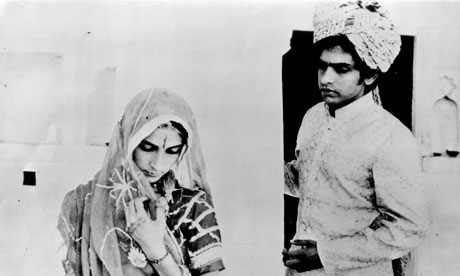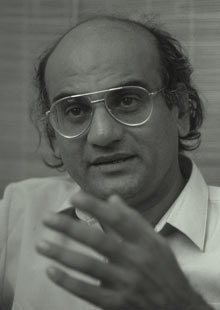
Mani Kaul's Duvidha (In Two Minds), 1975, with Raisa Padamsee and Ravi Menon.
Those who think of Indian cinema as the glitz of Bollywood on the one hand and the eloquent classicism of Satyajit Ray on the other miss a third important strand, manifested best by the radical director Mani Kaul, who has died from cancer aged 66. Kaul was a totally uncompromising film-maker who never sought popularity but pursued his own concerns, influenced by Ritwik Ghatak, his Bengali teacher and a great director in his own right, and by Robert Bresson and Andrei Tarkovsky among the foreign giants of the cinema. Watching Bresson's Pickpocket (1959), he once said, was one of the formative experiences of his life.


Mani Kaul in 1988.
He was, however, entirely his own man, who understood Indian art, music, literature and theatre as much as film. He was a stern critic of orthodox storytelling and especially the modern gyrations of Bollywood. "If film shows you something you already know," he once said, "where will it lead us?"
His own version of true cinema led to Kaul being admired by the more adventurous Indian and European critics and often adored by the film students he taught, but largely ignored by the public. Recently, opportunities were few and far between. In his last year, when he was fighting illness, he had a chance to direct a film about the Italian director Roberto Rossellini's visit to India in the 1950s. The screenplay was to be based on Dileep Padgaonkar's book Under Her Spell, but Kaul was too ill to start the shoot.
He was born in Jodhpur, in Rajasthan, to a Kashmiri family. His uncle was the actor-director Mahesh Kaul. Mani studied at film school first as an actor and then as a director. His first feature, Uski Roti (Our Daily Bread, 1970), became one of the key films of the new Indian cinema of the time. It tells the story of a woman who waits for her truck-driver husband every day with his food. When he doesn't appear, she begins to doubt his loyalty and finds out that he has a mistress in another town. The film is not an orthodox narrative, dealing instead with silence, mood and imagery. It caused a huge stir, even being lambasted in the Indian parliament by a member who said it was so boring she would never forget it. Kaul took the intended insult as high praise.
His most famous film was Duvidha (In Two Minds, 1975), an adaptation of a folktale from Rajasthan that visually copied the Rajasthani miniature style of painting. The story is simple. A merchant's son returns to his village with his bride but has to go away on business. She is left alone and a "ghost", possibly the product of her fertile imagination, assumes the form of her husband. When the real husband returns, the ghost is tied up in a leather bag, much to the woman's distress.
The film, beautifully shot, was shown widely in European arthouses. But India had and has no such cinemas, one of the main reasons why the films of Kaul, his fellow radical Kumar Shahani and many other talented film-makers could never make a real mark. Though funded by the Indian government's Film Finance Corporation (FFC) and given the promise of a screening on national television, the films of the Indian new wave were essentially on a hiding to nothing. They could not be shown in the huge cinemas where Bollywood's successful epics attracted full houses, and were often considered abstruse and uncommercial.
Kaul's group of documentaries, very unlike those put out by the FFC with sonorous, often English voiceovers, were as distinctive as his features. The best known is probably Dhrupad (1982), in which he examines one of the purest forms of Indian classical music. The film argues that both folk and classical idioms were derived, over some 2,000 years, from tribal music and the celebration of nature and the cycles of life. In the last shot, which extends for some six minutes, the camera pans eloquently over the skyline of Mumbai, looking at the slums and skyscrapers, accompanied by the Dhrupad form, to bring pattern and meaning to the chaotic existence of the sprawling city.
Although Kaul's body of work was considerable – he made two films, Nazar and Idiot (both 1991), based on the work of Dostoevsky – his inability to finance the films he wanted led him to teaching film in India, Europe and America, and also to studying the Indian music he loved. He became an accomplished singer in the process.
Although he took the hard road as a film-maker, achieving, at least latterly, far less than he deserved, his influence was considerable. It was once said of Kaul that he refused to be a passive carrier of the national artistic tradition and, with equal vehemence, was unconcerned with importing into India the western avant-garde experiment. Now that he has died, as is often the case in India, his work may well be studied with added appreciation. But not by the famous Bollywood director who once met him and said afterwards: "I simply didn't know what to talk to him about."
Kaul is survived by two sons and two daughters.
His own version of true cinema led to Kaul being admired by the more adventurous Indian and European critics and often adored by the film students he taught, but largely ignored by the public. Recently, opportunities were few and far between. In his last year, when he was fighting illness, he had a chance to direct a film about the Italian director Roberto Rossellini's visit to India in the 1950s. The screenplay was to be based on Dileep Padgaonkar's book Under Her Spell, but Kaul was too ill to start the shoot.
He was born in Jodhpur, in Rajasthan, to a Kashmiri family. His uncle was the actor-director Mahesh Kaul. Mani studied at film school first as an actor and then as a director. His first feature, Uski Roti (Our Daily Bread, 1970), became one of the key films of the new Indian cinema of the time. It tells the story of a woman who waits for her truck-driver husband every day with his food. When he doesn't appear, she begins to doubt his loyalty and finds out that he has a mistress in another town. The film is not an orthodox narrative, dealing instead with silence, mood and imagery. It caused a huge stir, even being lambasted in the Indian parliament by a member who said it was so boring she would never forget it. Kaul took the intended insult as high praise.
His most famous film was Duvidha (In Two Minds, 1975), an adaptation of a folktale from Rajasthan that visually copied the Rajasthani miniature style of painting. The story is simple. A merchant's son returns to his village with his bride but has to go away on business. She is left alone and a "ghost", possibly the product of her fertile imagination, assumes the form of her husband. When the real husband returns, the ghost is tied up in a leather bag, much to the woman's distress.
The film, beautifully shot, was shown widely in European arthouses. But India had and has no such cinemas, one of the main reasons why the films of Kaul, his fellow radical Kumar Shahani and many other talented film-makers could never make a real mark. Though funded by the Indian government's Film Finance Corporation (FFC) and given the promise of a screening on national television, the films of the Indian new wave were essentially on a hiding to nothing. They could not be shown in the huge cinemas where Bollywood's successful epics attracted full houses, and were often considered abstruse and uncommercial.
Kaul's group of documentaries, very unlike those put out by the FFC with sonorous, often English voiceovers, were as distinctive as his features. The best known is probably Dhrupad (1982), in which he examines one of the purest forms of Indian classical music. The film argues that both folk and classical idioms were derived, over some 2,000 years, from tribal music and the celebration of nature and the cycles of life. In the last shot, which extends for some six minutes, the camera pans eloquently over the skyline of Mumbai, looking at the slums and skyscrapers, accompanied by the Dhrupad form, to bring pattern and meaning to the chaotic existence of the sprawling city.
Although Kaul's body of work was considerable – he made two films, Nazar and Idiot (both 1991), based on the work of Dostoevsky – his inability to finance the films he wanted led him to teaching film in India, Europe and America, and also to studying the Indian music he loved. He became an accomplished singer in the process.
Although he took the hard road as a film-maker, achieving, at least latterly, far less than he deserved, his influence was considerable. It was once said of Kaul that he refused to be a passive carrier of the national artistic tradition and, with equal vehemence, was unconcerned with importing into India the western avant-garde experiment. Now that he has died, as is often the case in India, his work may well be studied with added appreciation. But not by the famous Bollywood director who once met him and said afterwards: "I simply didn't know what to talk to him about."
Kaul is survived by two sons and two daughters.
No comments:
Post a Comment